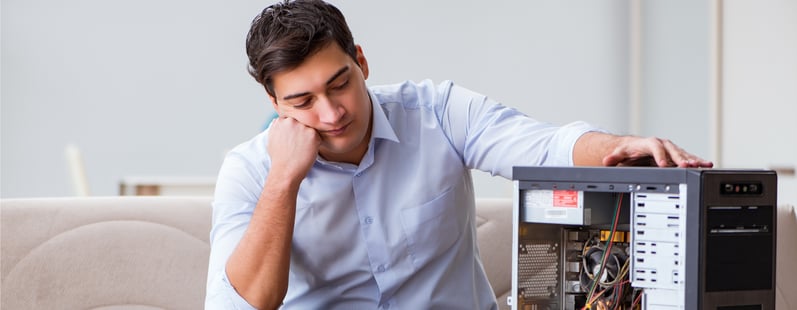When your business relies on a computer system to function, a computer failure can be devastating. From lost time to lost data, the effects of a system failure can be far-reaching. Computer system failures can occur for a variety of reasons, many of which can be prevented to help save your business from the effects of a system failure.

Reasons Why Computers Fail
One of the main reasons computer systems fail is due to human error. Even when you have safety systems in place, protocols must be followed, such as making sure your emergency batteries remain charged. Understanding the most common causes for a system failure can help develop robust safety systems and protocols.
Environmental Factors
The environment that your computer systems are stored and operated in can cause a failure if it is not appropriate for the hardware. Computer servers fail in the presence of excessive heat, making cooling systems essential. Because computers generate their own heat, the temperature that is optimal for a large server may conflict with the temperature that is preferred by employees.
Water is devastating to electronics. If your server room has a sprinkler system, even a small leak can cause a massive failure. Care should be taken to develop an appropriate fire protection system that will not compromise your system under normal circumstances. Water can also contaminate your generator fuel, making it useless in a power outage. Test your fuel regularly to avoid this problem.
Computer systems are also sensitive to the amount of electricity they are getting. Voltage spikes, such as caused by thunderstorms, can wipe out your system and cause you to lose data. Surge protectors can help regulate the electricity to prevent a dangerous spike in voltage.
Hardware and Software
Maintenance is an effective way to help prevent failures. Software should be kept updated with all available patches as they become available to solve any problems that have been discovered. Similarly, your virus protection software should be updated frequently to take advantage of the most recent security threats.
Hardware can also fail. While something like a circuit board failure is unavoidable, you can take steps to protect your business. Backup your data regularly to an external storage device, and learn to recognize the signs of a hardware failure. If you think your hardware is failed, contact your service professionals.
Power Loss
When the power goes out, your computer systems will too, which can lead to data loss and damage to your system. Having a back-up system in place is important, and should be carefully maintained.
A generator can help keep your systems up long enough to do important backups and save your data, before shutting down safely. Uninterruptible Power Supplies (UPS) are batteries that supply limited power. Both generators and UPS batteries should be maintained and kept fueled or charged.
If your company uses a Power Distribution Unit in your computer room to distribute power to the various components, this should also be kept in good working order to prevent a power outage to your equipment.
Computers are essential to modern business. Whether you have a small office or a large corporation, putting safeguards in place to protect your computer system helps protect your business from potentially devastating losses. Make sure that your business insurance is positioned to protect you in any technological down time, and talk to an agent near you to review your policy. Planning for power outages, carefully controlling the environment of the computer room, and developing protocols to reduce human error can all help keep your systems up and running.







